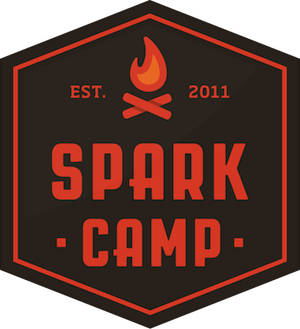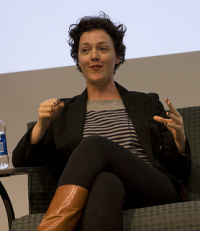 Editor’s Note: What were the most interesting and provocative ideas in journalism in 2012? We’re partnering with Spark Camp to produce a special end-of-year series to ask a group of smart people — Spark Camp’s alumni — that question.
Editor’s Note: What were the most interesting and provocative ideas in journalism in 2012? We’re partnering with Spark Camp to produce a special end-of-year series to ask a group of smart people — Spark Camp’s alumni — that question.
Not familiar with Spark Camp? It’s a series of weekend gatherings involving the future of media, featuring intimate conversations, idea development, and problem-solving, and focused on a specific theme. (We at the Nieman Foundation hosted a Spark Camp on the subject of money this summer.) Here’s how they describe themselves:
About 60 invitees attend Camp. Once confirmed, Campers soon realize that they’re each uniquely connected to everyone assembled, whether it’s through a shared hobby, or favorite book or even a past workplace. By deeply connecting our Campers not just professionally but on a number of different levels, long-lasting relationships are catalyzed. Spark Camps have focused on “data,” “money,” and “real-time information,” and are highly creative gatherings that further innovation and spark practical solutions to the challenges the media and technology industries face.
Spark Camp is a 501(c)(3) nonprofit organization, founded in 2011 by Amy Webb, Amanda Michel, Jenny 8. Lee, Matt Thompson, and Andrew Pergam, who believe that journalists can find ideas and inspiration from outside their industry. They argue that ideas are meant to be challenged, and that a diversity of approaches and people makes for the best kind of conversation.
Over the rest of this week, we’ll be bringing you the thoughts of Spark Camp alumni on the most important ideas in journalism this year. First up are:
— Matt Thompson, Spark Camp co-founder and manager of digital initiatives at NPR. Matt is also an adjunct faculty member at the Poynter Institute and a board member at the Center for Public Integrity.
— Greg Linch, special projects producer at The Washington Post. Prior to the Post, he was news innovation manager at Publish2.
— Glynnis MacNicol, co-founder of TheLi.st and the former media editor at Business insider. Prior to that, she was a founding editor of Mediaite.com.
 So, according to the script Robin Sloan and I wrote for EPIC 2014, it was right between 2010 and 2011 that the digital behemoth Googlezon started mining facts from various data sources and algorithmically recombining them into news stories. As if on cue, Narrative Science was founded in 2010. According to Wired, the company’s fact-mining robotic algo-writers produced 400,000 accounts of Little League games last year and was on track to produce another 1.5 million or so this year. The company’s blog for Forbes is just about as compelling as any collection of company earnings previews I’ve ever read (i.e. not at all).
So, according to the script Robin Sloan and I wrote for EPIC 2014, it was right between 2010 and 2011 that the digital behemoth Googlezon started mining facts from various data sources and algorithmically recombining them into news stories. As if on cue, Narrative Science was founded in 2010. According to Wired, the company’s fact-mining robotic algo-writers produced 400,000 accounts of Little League games last year and was on track to produce another 1.5 million or so this year. The company’s blog for Forbes is just about as compelling as any collection of company earnings previews I’ve ever read (i.e. not at all).
As everyone who’s covered the company has noted, Little League game briefs and earnings previews are just an appetizers for the feast of personal/local/sensor-driven/etc. data that’s starting to stuff our lives. After I give Narrative Science or its ilk access to my Nest thermostat or my Withings scale (I don’t have either of those things; just riffing here), I imagine I’ll find its competent but unimaginative monthly reports pretty interesting. Have them hire one of the politi-quants (Nate Silver, Sam Wang, Drew Linzer, etc.), and you’ve got yourself a competent-but-unimaginative FiveThirtyEight for every local congressional election. (“There aren’t enough polls in the field to be too confident this far out, but both the history of this district and other local polling trends suggest that Byron McGillicuddy is the candidate to beat in HR 7.”)
Again, it’s not like we didn’t see this coming, but now it’s officially here. I’m really curious how much this phenomenon is going to touch the life of your average media consumer. If we can get this company to robo-write Tom Friedman columns (Narrative Science, now with patented MetaphorMix™ technology!), it will already have changed the world.
 One big idea: George Dyson’s thesis about a universe of self-replicating code, as described in his book Turing’s Cathedral. Reading this book roughly a year after James Gleick’s The Information helped connect and expand some key concepts in my mind. Specifically, in thinking about the shared fundamentals of memes, genes and code — along with the concept self-replicating automata. One key idea, as Dyson says in his Edge interview: “What’s, in a way, missing in today’s world is more biology of the Internet.”
One big idea: George Dyson’s thesis about a universe of self-replicating code, as described in his book Turing’s Cathedral. Reading this book roughly a year after James Gleick’s The Information helped connect and expand some key concepts in my mind. Specifically, in thinking about the shared fundamentals of memes, genes and code — along with the concept self-replicating automata. One key idea, as Dyson says in his Edge interview: “What’s, in a way, missing in today’s world is more biology of the Internet.”
The book also reframed in my mind the technology behind search engines and social networks as distinctly analog. As Dyson writes: “These computational structures use digital components, but the analog computing being performed by the system as a whole exceeds the complexity of the digital code on which it runs.”
One concept from something that came up at Spark Camp Data in Austin in the context of statistics: the idea of measuring uncertainty is utterly fascinating. How much better would our measures of journalism be with quantified uncertainty in the mix?
An over-hyped idea from 2012 was “digital” — namely, the idea of “digital first.” Despite how correct it is on its face, we really need to first think of who/what our journalism is for, why we’re doing it, and then where and how we’ll publish, engage, etc. At the risk of proposing a motto in the cliché “X first” name/slogan vein, we should really be “people first.”
Included in this is mobile. Yes, mobile is already huge and growing enormously. This is exciting and an area news needs to pursue aggressively and be up to speed or — ideally — ahead of the pack on. There are myriad possibilities. But, instead of getting locked into another platform focus, we need to consider broader uses and the roles journalism fills, as Clay Christensen, David Skok, and James Allworth wrote in “Breaking News” and — months before that — [Spark Camp alumnus] Stijn Debrouwere articulated so well in his “Fungible” post. We also need to think about what comes after mobile. What’s next? We must always first think about the purposes and roles we want to fulfill, then think about the products and presentation. Whether that’s a tablet, phone, Google Glass, retinal implant, or neuronal transmitter, we should take the long view.
 In 2012, the idea of individual privacy, and how we define that in the Facebook age — a subject we discussed at Spark Camp Money — has really stuck with me. The conclusion, and I think it will prove out, is that instead of attempting to erase one’s digital footprint online (an increasingly impossible task) we will begin to create two distinct, but equally important identities: the IRL person and the online person. In this future, the latter would not attempt to suppress information so much as promote the sort of info we’d prefer to have out there about ourselves.
In 2012, the idea of individual privacy, and how we define that in the Facebook age — a subject we discussed at Spark Camp Money — has really stuck with me. The conclusion, and I think it will prove out, is that instead of attempting to erase one’s digital footprint online (an increasingly impossible task) we will begin to create two distinct, but equally important identities: the IRL person and the online person. In this future, the latter would not attempt to suppress information so much as promote the sort of info we’d prefer to have out there about ourselves.
In 2013, I’ll wonder: